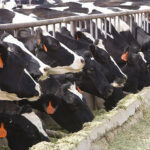Gov. Tony Evers is again proposing a hike in concentrated animal feeding operation permit fees, though the ask isn’t as high as what Republicans stripped from his past budgets.
A concentrated animal feeding operation, or CAFO, is a livestock operation with at least 1,000 animal units. The Department of Natural Resources can also consider smaller operations to be CAFOs if they discharge pollutants into navigable waters or contaminate a well.
Evers’ budget seeks to increase the annual permit fee for the state’s 337 CAFOs from $345 to $545, $115 lower than what he previously requested. Evers also proposed a notification system to ensure local communities are informed of permit violations related to groundwater after a bill to do so never made it to his desk. Evers’ proposal also recommends investing $145,100 and creating a position to implement advanced wastewater treatments systems on large Wisconsin farms.
Just this week, De Pere-based Ledgeview Farms was ordered to pay a $320,000 settlement for repeatedly allowing manure and wastewater to spill into nearby waterways.
The measures are likely to be removed from the budget, with Joint Finance Committee Republicans saying they will build from base levels.
JFC Co-chair Sen. Howard Marklein, who is also a member of the Senate Agriculture and Tourism Committee, in a statement to WisPolitics.com in response to the proposals said the budget would include “virtually no policy.”
“I believe that policy decisions should go through the legislative process as a bill so that the ideas receive full public hearings, executive sessions and floor votes before they become law. They should not be buried in a budget document,” the Spring Green Republican said.
Marklein’s office declined to say whether he would support bills that do what Evers’ proposals recommend.
Rep. Joel Kitchens, a member of the Assembly Agriculture Committee, told WisPolitics.com he doesn’t have a stance yet on the permit fee increase. The Sturgeon Bay Republican’s district contains 17 CAFOs, the third-highest amount in the state behind Manitowoc County, which has the most in the state, and Brown County.
“We need to look that over and decide what’s appropriate. Obviously, that’s not a huge expense for multibillion-dollar businesses. But yeah, that one I’ll kind of stay out of,” Kitchens said.
Kitchens’ district also houses Kinnard Farms, a dairy CAFO with 11,369 animal units. Environmental advocates and the local community have criticized the CAFO for groundwater contamination. The DNR has limited the farm from exceeding 11,369 animal units, noting in a fact sheet the farm’s “persistent exceedances of groundwater quality standards for nitrate and bacteria.” The farm is involved in an ongoing lawsuit against the DNR over permit requirements and received four notices of violations before they were referred to the Department of Justice in 2021.
It’s not the first time the guv has requested a price hike for CAFO permits, but Republicans have rejected past calls. The latest request reduces the total permit fees CAFOs would pay compared to his earlier proposals.
In his 2019-2021 budget, Evers asked for the state to raise the permit fee from $345 to $660 and include a $3,270 application fee upon receiving a permit and every five years thereafter. In his 2021-2023 budget, he called for an increase to $545, and to require a $3,270 application fee. That 2021-2023 proposal didn’t specify that CAFO operators would have to pay every five years as well.
Evers’ latest proposal for 2023-2025 includes the same boost to a $545 annual fee, but doesn’t specify an application fee as in previous proposals.
Clean Wisconsin Water Program Director Scott Laeser told WisPolitics.com he believes some farming groups in the state are open to boosting permit fees alongside CAFO program improvements.
Laeser said the number of farms in the state has gone up, but there hasn’t been an increase in DNR resources to meet the workload. There is a total of 25 staff that have a role in the permitting process, according to the DNR CAFO Permit Coordinator Tyler Dix.
“Sometimes farms will get frustrated when they don’t feel like they’re able to get a response to a question or a concern in time,” Laeser said. “And sometimes community members will get frustrated because they don’t feel like the DNR has the resources to respond to concerns or complaints as often as they should.”
Dairy Business Association Director of Public Affairs Karen Gefvert in an email to WisPolitics.com said the DBA believes increased permit fees need to come with changes to the DNR’s CAFO program.
“DBA has been transparent about the need to provide efficiencies within the CAFO permitting process. Any increase in the annual CAFO fee must also include opportunities for program efficiencies,” Gefvert said.
CAFOs are required to obtain Wisconsin Pollutant Discharge Elimination System permits to prevent water contamination. To obtain a permit, CAFOs must have zero runoff to navigable waters from areas that house animals and manure and feed storage areas. The permits also require operators to implement plans for manure spreading and processing wastewater, as well as response plans in the event of a spill, among other things.
If operators don’t manage their farms carefully, manure runoff can pollute groundwater that communities draw on for drinking water and pose a public health risk.
Gefvert said changes to the permitting process could include creating an online portal to allow more transparency about permit status during the application process and requiring permit applications and renewals to be completed within a certain timeframe. The window would be shorter for farms with no construction changes that are in compliance with program requirements.
She said another change would be to create a program to certify nutrient management and engineering professionals to complete reports on CAFO application requirements, which only DNR staff are currently allowed to do. DNR staff would still have final approval of all permit applications, Gefvert added.
Wisconsin Dairy Alliance President Cindy Leitner in an email to WisPolitics.com said the DNR needs to make changes to the CAFO program. She said the nonprofit has requested a professional program similar to what Gefvert mentioned.
“Before adding even more reporting requirements or increasing fees, there needs to be a fundamental overhaul of DNR’s CAFO program,” Leitner wrote.
She said 70 of 307 dairy CAFO permits have expired, which she attributed to the DNR’s delayed response.
Evers in his budget proposal has also recommended $96,000 in one-time funds to create a system to notify local agencies and “interested parties” when WPDES permit holders violate groundwater-related limits. The measure would require the DNR to inform the health department and land and conservation department in the county where the incident occurred, as well as any nearby affected counties, within seven business days.
Rep. Jill Billings introduced a bipartisan bill in 2019 that was almost identical to Evers’ proposal, though Evers added a requirement to notify county health and land and conservation departments at least 24 hours before anyone else. Billings’ legislation died in committee.
The La Crosse Dem told WisPolitics.com the measure is important because clean drinking water is essential to good health. She said she will reintroduce the proposal and work to gain more bipartisan support if it is removed from the budget.
“The important thing for me so that the people in the area have the information to tell, to let them know that their drinking water may not be clean,” Billings said.
Billings said the goal wasn’t to be “pointing fingers at anyone” but to make sure people know when their water has been contaminated.
Gefvert said while there is no mandatory notification process in place to inform local and county officials, they may be notified on an unofficial basis.
“Regardless, DBA has significant concerns with the mandatory notification requirement based on the directive that the procedure would be created through the rule making process and may not take into consideration a dispute by the permit holder of an alleged [violation],” Gefvert said.
The requirement to inform “interested parties” could cause confusion, Gefvert added.
Leitner in a statement wrote the proposal ignores the fact that CAFOs already have a “heavy regulatory burden,” which she argued drives dairy producers to other states.
“Governor Evers’ proposal ignores these realities, and we look forward to the Legislature removing these provisions from the budget that is ultimately presented to him,” Leitner said.
Dix said CAFOs that apply for permits that don’t propose any changes, such as building new facilities, are still able to operate under their expired permits as long as they apply for renewal on time.
Dix said the department prioritizes applications that propose permit changes and need more time to process, which usually takes about six months. Dix said issues with applications can sometimes draw out the process.
“So that could also weigh on the length of time it takes to review it. But, you know, the other side of that coin is if the farm submits everything that’s approvable on the first round, then they’ll get their approval quicker, too,” Dix said.
Meanwhile, Laeser said the public has a right to know about spills that could endanger public health in a timely manner.
“We know from places like northeast Wisconsin that contamination can move really quickly in a matter of hours or days,” he said. “And getting information out to people whose wells could potentially be contaminated is absolutely something that should be a priority for all parties.”
–WisPolitics.com






